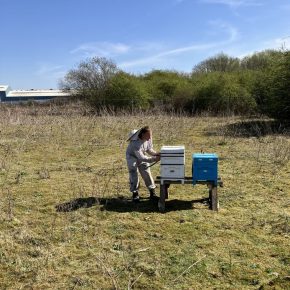
GUEST ARTICLE: Planning approvals edge higher on last year
Glenigan, one of the construction industry’s leading insight and intelligence experts, has released the March 2024 edition of its Construction Review.
The Review focuses on the three months to the end of February 2024, covering all major (>£100m) and underlying (<£100m) projects, with all underlying figures seasonally adjusted.
It’s a report which provides a detailed and comprehensive analysis of year-on-year construction data, giving built environment professionals a unique insight into sector performance over the last 12 months.
Whilst the March Review highlights the consistently weak construction-start performance over the first two months of 2024 as the industry navigates a tough economic landscape, planning approvals provided a welcome boost to a beleaguered sector.
The stats
Averaging £6,080 million per month, project-starts dropped 17% against the preceding three months’ performance, to stand 30% lower than a year ago. Main contract awards were also sluggish, dipping 13% in the run-up to March and down 34% on 2023 figures.
However, detailed planning approvals registered a modest 5% increase compared to the previous year, despite falling back 24% against the preceding period. Approvals were boosted by the £1,268 million A12 Chelmsford to A120 junction improvement works in Essex.

Commenting on these results, Glenigan’s Economic Director, Allan Wilen, says: “Persistent adverse socioeconomic conditions continue to hold back significant spending in both the public and private sectors. However, a rise in underlying infrastructure starts during the last three months and a modest uptick in planning approvals compared to last year indicates the current situation may slightly ease during the second half of the year.
“Whilst the Chancellor’s Spring Budget commitment to targeted funding for 15 new special free schools and for new children’s homes will open up work for the sector, the Government has been cautious about making any big infrastructure commitments during the run-up to the next general election.
“This will affect the delivery of existing and planned major capital projects and the lack of clarity may have a knock-on effect across the construction sector, with private investors likely to keep their powder dry as they wait out the uncertainty.”
The sector-specific and regional index follows. Measuring underlying project performance, the March edition painted a picture of general decline. Project-starts across almost every vertical plummeted in the three months to February.

Sector Analysis – Residential
Overall residential starts-on-site fell during the three months to February, dropping 16% during the index period to stand 19% lower than a year ago.
Drilling into the verticals, private housing was down 11% on the previous year, declining 17% against the preceding three months. Social housing also performed poorly, with work commencing on-site slipping back 31% during the three months to February and plummeting 30% against the previous year’s figures.
Sector Analysis – Non-Residential
The value of starts fell across most non-residential sectors during the three months to February, with health the only sector to experience growth against both periods.
Offices and Community & Amenity were two of only three verticals to experience growth against the preceding three months, rising 18% and 21%, respectively. However, both failed to increase on the previous year.
Health starts enjoyed a strong period, increasing 24% against the preceding three months and finishing 19% above last year’s figures.
Civils work also increased against the preceding three months, up 19%. However, these figures failed to increase against the year before.
Civils growth was boosted by infrastructure activity, with starts increasing by nearly a third (31%) against the preceding three months but remaining down by a fifth (22%) on a year ago. Utilities starts increased 3% against the preceding three-month period but were 18% down on the previous year.
Industrial performance was disappointing, sinking 38% during the three months to February to stand 48% lower than a year ago. Retail lost ground as well, with the value of project-starts declining 22% against the preceding three months and 23% against the previous year.
Education was also on the decline, with the value of underlying project-starts slipping back 18% against the preceding three months to stand 39% down on 2023 levels.
Hotel & Leisure starts decreased 3% against the preceding three months but crashed on the year before, falling back 39% compared with 2023 figures.
Regional Performance
Regional performance was poor, with most of the UK experiencing a weakening in project-starts during the three months to February.
However, London offered a bright spot, with project-starts performing relatively well compared to the rest of the UK, increasing 22% against the preceding three months. Despite this, starts failed to match 2023 levels, remaining 15% behind.
It was a similar story in the West Midlands, with the value of project-starts increasing 15% against the preceding three months but remaining 8% down on the previous year.
Scotland experienced a similar trend, advancing 2% against the preceding three months but falling back by a quarter (25%) on the year before.
Northern Ireland and the North East weakened against the preceding three months, falling back 4% and 31%, respectively. Both regions were down on the previous year, remaining 16% and 43% lower than a year ago.
Some areas of the UK fared even worse, including Wales where the value of project-starts fell 37% against the preceding three months to stand a whopping 57% down on a year ago. This was also the case in Yorkshire & the Humber which crashed compared to the preceding three months and the previous year, down 18% and 37%, respectively.
Latest news

29th April 2025
Senior pledges to ‘bee’ part of the solution with new biodiversity initiative
Senior Architectural Systems has installed its first on-site beehive, marking another step forward in its commitment to sustainability and biodiversity.
Posted in Articles, Building Industry News, Building Products & Structures, Building Services, Curtain Walling, Doors, Glass, Glazing, Innovations & New Products, news, Restoration & Refurbishment, Retrofit & Renovation, Sustainability & Energy Efficiency, Walls, Windows
29th April 2025
West Fraser range delivering key benefits for South-East carpentry company
An experienced carpenter and building site manager who has recently set up his own company is using high performance panel products from the West Fraser range.
Posted in Articles, Building Industry News, Building Products & Structures, Building Systems, Case Studies, Garden, Restoration & Refurbishment, Retrofit & Renovation, Sustainability & Energy Efficiency, Timber Buildings and Timber Products
29th April 2025
CPD Courses Available Online From Ecological Building Systems
Ecological Building Systems, a leading supplier of natural building products for sustainable construction, has revealed its comprehensive CPD programme for the year ahead.
Posted in Articles, Building Industry Events, Building Industry News, Building Products & Structures, Building Services, Continuing Professional Development (CPD's), Information Technology, Innovations & New Products, Insulation, Restoration & Refurbishment, Retrofit & Renovation, Seminars, Sustainability & Energy Efficiency, Training, Walls, Waste Management & Recycling
29th April 2025
WindowBASE launches new prospect databases at FIT Show
Visit WindowBASE at the FIT Show to see first-hand how it helps companies find new customers – the company is launching an easy-to-use, intuitive platform on Stand G16 at the NEC Birmingham from 29th April – 1st May.
Posted in Articles, Building Industry Events, Building Industry News, Building Products & Structures, Building Services, Doors, Exhibitions and Conferences, Glass, Glazing, Information Technology, Innovations & New Products, Posts, Publications, Research & Materials Testing, Restoration & Refurbishment, Retrofit & Renovation, Windows
 Sign up:
Sign up: